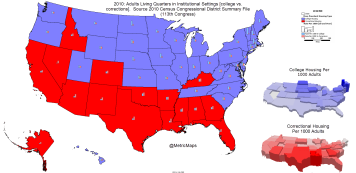Hi friends. Friday=time for our weekly Pick 6! Our Pick 6 consists of 6 informative, insightful reentry & criminal justice-related news articles and commentaries that we’ve been following throughout the week. We welcome your thoughts and feedback, so don’t be shy!
1.) Sixteen states have more people in prison cells than college dorms (The Grio)
David A. Love of The Grio writes, “As was reported in MetricMaps, there are 16 states where there are more bodies filling up the prisons than there are students living in college dormitories. What is truly fascinating, maybe even disturbing, is that nearly all of these 16 states are located in the South, the bottom portion of the country…Let than sink in for a minute. More people behind bars than in the dorms. What could it be about the South that would explain this? Could it be a tradition of slavery, racial violence and Jim Crow segregation, a legacy of criminalizing and dehumanizing people and of just not treating folks very well?…It is no accident that the states which imprison the most – including the Deep South — are among the poorest and find themselves at the bottom of the barrel in terms of life expectancy, health standards and education. After all, Dixie has a great deal of experience with depriving people of educational opportunity when it forbade blacks to read and write, in favor of imprisoning them against their will on slave plantations. In addition, the Slave Codes created a police state that criminalized black people and singled them out for punishment. And the era of Jim Crow segregation only continued the racial oppression and the forced labor and imprisonment, even up until the present day.”
2.) Woman who killed man she said abused her can’t escape felony past (Washington Post)
Fredrick Kunkle of the Washington Post reports, “Shari L. Thomas went to prison more than 25 years ago for killing the man who she said had abused her as a child. She used her time there to remake herself, becoming the first woman in Virginia to obtain a college degree behind bars. She earned a master’s degree in biotechnology after her release. She has kept her record clean since, managing research laboratories for major hospitals and pharmaceutical companies. In the past few years, perhaps because of the nation’s abiding fear of crime, its litigiousness, or the Internet’s ease at churning up background information that may not have surfaced before, Thomas has been rejected or terminated from several high-paying jobs. She had been making $150,000 six years ago. Now she is on food stamps…She could lose her Cecil County, Md., home. “I came home and got my
master’s degree,” said Thomas, 50. “I’d been working 18 years with no problem. When is enough enough?… And yet even now, her criminal record has the power to reach through time, upending her life…“I just feel like the punishment never ends,”
3.) California’s Death Row has just about run out of room (KCRW-Los Angeles)
Darrell Satzman reports, “More than 750 inmates in California have been condemned to death. But no one in this state has been executed in nearly a decade – and with new inmates arriving every month, Death Row has just about run out of space. Gov. Jerry Brown is asking the Legislature for more than $3 million to open 100 new cells for condemned men at San Quentin Prison. The request is included in Brown’s $113 billion budget proposal…There are currently 731 men and 20 women on Death Row in California. Almost all of the men are at San Quentin, while the women are housed at a prison in Chowchilla.”
4.) Poverty Shrinks Brains from Birth (Scientific American)
According to new studies conducted by a team led by neuroscientists Kimberly Noble from Columbia University in New York City and Elizabeth Sowell from Children’s Hospital Los Angeles, California, The stress of growing up poor can hurt a child’s brain development starting before birth, research suggests—and even very small differences in income can have major effects on the brain. Researchers have long suspected that children’s behavior and cognitive abilities are linked to their socioeconomic status, particularly for those who are very poor. The reasons have never been clear, although stressful home environments, poor nutrition, exposure to industrial chemicals such as lead and lack of access to good education are often cited as possible factors…Still, the researchers are hopeful that the impacts could be reversible through interventions such as providing better child care and nutrition. Research in humans and in other animals suggests that is the case: a study in Mexico, for instance, showed that supplementing poor families’ income improved their children’s cognitive and language skills within 18 months. “It’s important for the message not to be that if you’re poor your brain is smaller and will be smaller forever,” Sowell says.”
5.) The rise of the working poor and the non-working rich (Baltimore Sun)
In an opinion piece for the Baltimore Sun, former U.S. Secretary of Labor and professor of public policy at UC Berkeley, Robert Reich writes, “Many believe that poor people deserve to be poor because they’re lazy…In reality, a large and growing share of the nation’s poor work full time — sometimes 60 or more hours a week — yet still don’t earn enough to lift themselves and their families out of poverty. It’s also commonly believed, especially among Republicans, that the rich deserve their wealth because they work harder than others. In reality, a large and growing portion of the super-rich have never broken a sweat. Their wealth has been handed to them. The rise of these two groups — the working poor and non-working rich — is relatively new. Both are challenging the core American assumptions that people are paid what they’re worth, and work is justly rewarded. Six of today’s 10 wealthiest Americans are heirs to prominent fortunes. The Walmart heirs alone have more wealth than the bottom 40 percent of Americans combined…Americans who became enormously wealthy over the last three decades are now busily transferring that wealth to their children and grandchildren. The nation is on the cusp of the largest inter-generational transfer of wealth in history. A study by the Boston College Center on Wealth and Philanthropy projects a total of $59 trillion passed down to heirs between 2007 and 2061. As the French economist Thomas Piketty reminds us, this is the kind of dynastic wealth that’s kept Europe’s aristocracy going for centuries. It’s about to become the major source of income for a new American aristocracy…That widening inequality — combined with the increasing numbers of people who work full time but are still impoverished and of others who have never worked and are fabulously wealthy — is undermining the moral foundations of American capitalism.”
6.) The poor are treated like criminals everywhere, even at the grocery store (Washington Post)
In an opinion piece for the Washington Post, Jeanine Grant Lister writes, “Anger toward those living below the poverty line seems to only be increasing. Maine and Missouri have proposed bills limiting residents’ food choices if they use SNAP. Missouri House Bill 813 would bar the state’s 930,000 food stamp recipients from using their benefits to buy cookies, chips, soda, energy drinks, steak and seafood. (The legislature also implemented mandatory drug testing for TANF applicants in 2011.) If the bill becomes law, a Missourian can’t buy a can of tuna with an EBT card. Tortilla chips to go with salsa? Nope. Flank steak — tough, stringy and the only cut of beef I can afford — is off limits, too. Who are these people, and what makes them think that what we eat is their business? And given that the average food stamp allotment in my state in 2013 came out to just $1.41 per person per meal, I wonder if they understand that recipients couldn’t buy lobster if they wanted to. In America today, being poor is tantamount to a criminal offense, one that costs you a number of rights and untold dignities, including, apparently, the ability to determine what foods you can put on the dinner table. It’s as if middle-class and wealthy Americans think poor people live under the poverty line by choice, as if a sensible person would choose to subsist on so little. We’re barely getting by. Don’t tell us what to buy at the grocery store.”
+1) Does barbaric Georgia prison cell photo depict an American Abu Ghraib? (Christian Science Monitor)
Patrik Jonsson reports, “A shocking prison photo of inmates taken at a Georgia correctional facility could intensify a halting effort in the United States to alleviate poor prison conditions that can lead to unchecked barbarism likened to an American Abu Ghraib. The picture from Burruss Correctional Training Center in Forsyth, Ga., shows three young and shirtless African-American male prisoners. One of them is pointing at the camera as though holding a gun, another is holding a makeshift leash, and the third, an 18-year-old, is on his knees, his left eye closed from a beating, and the leash lashed around his neck…“I think this picture can go a long way toward galvanizing a discussion about what prisons are for – particularly, does anybody believe that these men are deterred by prison?” says Jonathan Simon, a University of California, Berkeley law professor and author of “Mass Incarceration on Trial.” “You have to ask yourself: If the basic story that we tell ourselves is that it’s all about laws and sending people to prison because they violated laws and harmed other people, how can we possibly justify sending them to a place where that is happening to them?” Professor Simon says.”
+2) Obama Commutes 22 Drug Sentences, Instantly Doubling The Number of Commutations He’s Issued (Huffington Post)
“President Barack Obama commuted the sentences of 22 individuals on Tuesday, more than doubling the number of commutations he has issued in the six-plus years he’s been in office. The men and women granted the reprieves had been imprisoned under an “outdated sentencing regime,” the administration concluded. Eight of the 22 inmates had been sentenced to life imprisonment and would have died behind bars. “Had they been sentenced under current laws and policies, many of these individuals would have already served their time and paid their debt to society,” White House counsel Neil Eggleston said in a statement shared in advance with The Huffington Post. “Because many were convicted under an outdated sentencing regime, they served years — in some cases more than a decade — longer than individuals convicted today of the same crime.” The president sent a letter to each of the commutation recipients encouraging them to take advantage of their post-prison opportunity. An administration official said that this was the first time Obama has sent such letters during his presidency.”
Infographic of the Week) Economic Benefits of Closing Academic Achievement Gaps (Center for American Progress)
From the Center for American Progress come this compelling infographic that, “demonstrate[s] the benefits of closing the achievement gap. Despite the fact that 50.3 percent of students in public K-12 classrooms across America are children of color, black and Hispanic children are still far more likely than non-Hispanic white children to grow up in poverty. And on average, children of color score lower on math and science tests than their non-Hispanic white peers. These two trends are not coincidence; families’ financial security affects children’s ability to reach their academic potential. These children are the future of our workforce, and we need to ensure that they are equipped with the skills our future economy needs.”

